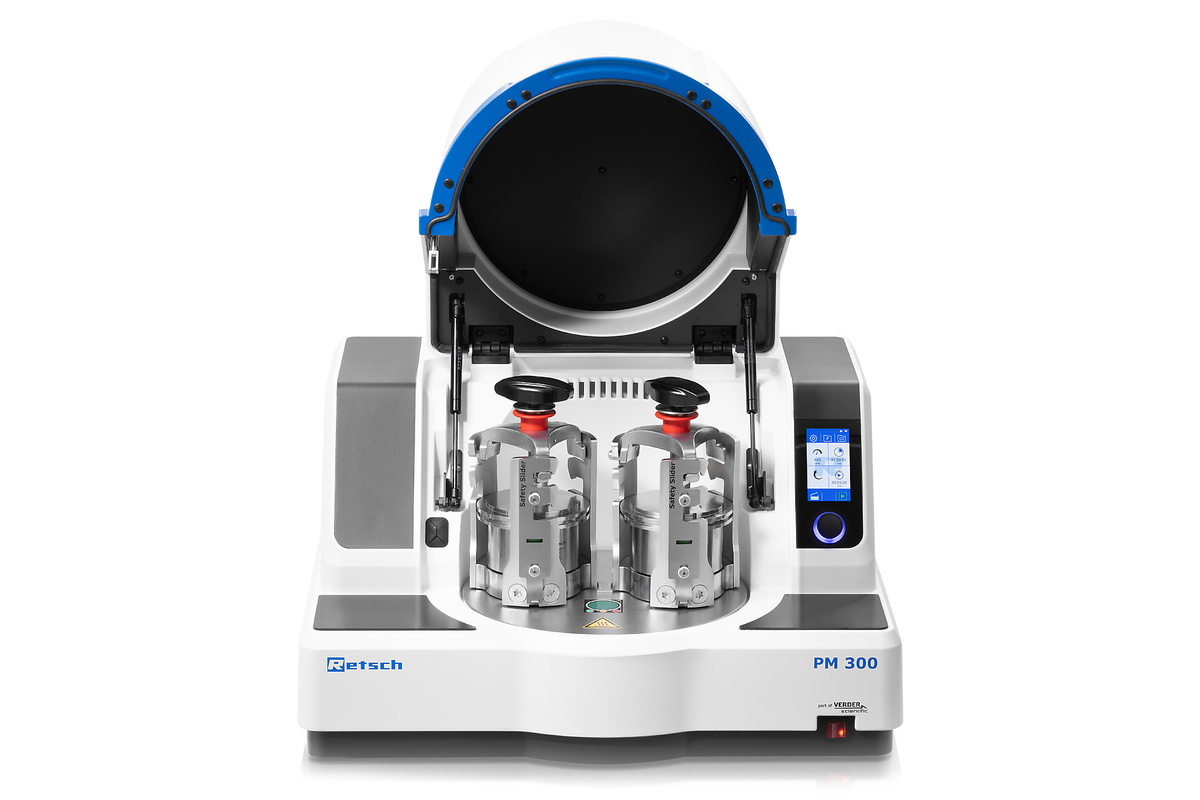Canada’s Instrumentation Leader Since 1946.


The Planetary Ball Mill PM 300 is a powerful and ergonomic benchtop model with two grinding stations for grinding jar volumes up to 500 ml.
The Planetary Ball Mill PM 300 is a powerful and ergonomic benchtop model with two grinding stations for grinding jar volumes up to 500 ml. This setup allows for processing up to 2 x 220 ml sample material per batch. Thanks to the high maximum speed of 800 rpm, extremely high centrifugal forces result in very high pulverization energy and consequently in short processing times.
The PM 300 is ideally suited for virtually all industries where the quality control process places the highest demands on purity, speed, fineness and reproducibility. Thanks to its enormous energy input of up to 64.4 times the acceleration of gravity, this mill is the perfect choice for tasks in research like mechanochemistry (co-crystal screening, mechanosynthesis, mechanical alloying and mechano-catalysis), or for ultrafine colloidal grinding on a nanometer scale.
Operation of the RETSCH planetary ball mills is particularly safe. They feature a robust Safety Slider which ensures that the mill can only be started after the grinding jar has been securely fixed with a clamping device. The self-acting lock ensures that the jar is seated correctly and securely. This proven solid mechanical system is less failure-prone than electronic solutions – the user has full access to the sample at any time. When the electronic system fails, it is not possible to unlock the jars, for example. A unique safety feature of the PM 300 is an acoustic signal and notification in the display when the clamping unit has been fixed with the required force of 25 Nm. RETSCH offers a convenient clamping aid to facilitate the process. This is particularly helpful when the machine is operated in the upper speed range between 600 and 800 rpm.
Wet grinding is used to obtain particle sizes below 5 µm, as small particles tend to get charged on their surfaces and agglomerate, which makes further grinding in dry mode difficult. By adding a liquid or dispersant the particles can be kept separated.
To produce very fine particles of 100 nm or less (nano-scale grinding) by wet grinding, friction rather than impact is required. This is achieved by using a large number of small grinding balls which have a large surface and many friction points. The ideal filling level of the jar should consist of 60 % small grinding balls.
For more details on jar filling, wet grinding and sample recovery watch the video.
The graphic shows the result of pulverizing titanium dioxide (TiO2) at 650 rpm and 800 rpm in the PM 300 and the net processing time. With the higher energy input at 800 rpm, the particle size decreases faster. However, the increased warming effects at 800 rpm should also be considered, as they might make longer breaks necessary.
RETSCH Planetary Ball Mills are perfectly suited for processes like mechanical alloying or mechanosynthesis. For most reactions, the 1:-2 speed ratio of jar to sun wheel of the models PM 100 and PM 200 is fully adequate, as the ball charge produces enough impact energy. However, greater energy is required for some reactions. Here the PM 400 MA can be used with the increased speed ratio of 1:-2.5 or 1:-3.0.
The PM 300 works with a speed ratio of 1:-2, but in contrast to other models, it reaches up to 64.4 x acceleration of gravity thanks to the maximum speed of 800 rpm and the large sun wheel. Together with the option to use four small, stackable grinding jars sized 12 to 80 ml for small scale operations, or two jars sized up to 500 ml for upscaling purposes, this planetary ball mill is highly suitable for research applications in mechanochemistry.
The performance and the result of sample preparation are also determined by the choice of the grinding jar and its ball charge. The EasyFit range of jars has been specially designed for extreme working conditions such as long-term trials, even at maximum speed of 800 rpm, wet grinding, high mechanical loads and maximum speeds as well as for mechanical alloying. This line of jars is suitable for all RETSCH planetary ball mills.
The new EasyFit grinding jar series features a structure on the bottom of the 50-500 ml jars called Advanced Anti-Twist (AAT). This ensures that the jars are tightly fixed without the risk of twisting, even at high speed, and that wear and tear is drastically reduced. Secure clamping of the jars is made much easier: to find the correct clamping position, a maximum twist of 60° is required.
The geometry of the EasyFit jars in the 50 ml and 250 ml sizes has been enlarged in diameter and reduced in height compared to the previous “comfort” models. This offers two advantages: better grinding results and interchangeable lids, as there are only three diameter dimensions for the entire grinding jar range.
Diameter categories
With a special adapter, co-crystal screening can be carried out in a planetary ball mill, using disposable vials such as 1.5 ml GC glass vials. The adapter features 24 positions arranged in an outer ring with 16 positions and an inner ring with 8 positions. The outer ring accepts up to 16 vials, allowing for screening up to 64 samples simultaneously when using the Planetary Ball Mill PM 400. The 8 positions of the inner ring are suitable to perform trials with different energy input, e.g. for mechanosynthesis research.
Both the aeration lid and GrindControl can now be equipped with inlays of different materials. Thus, the lid can be used for, e. g. a steel and a zirconium oxide jar by simply exchanging the inlay.
To produce optimum grinding results, the jar size should be adapted to the sample amount to be processed. The grinding balls are ideally sized 3 times bigger than the largest sample piece. Following this rule of thumb, the number of grinding balls for each ball size and jar volume is indicated in the table below. To pulverize, for example, 200 ml of a sample consisting of 7 mm particles, a 500 ml jar and grinding balls sized at least 20 mm or larger are recommended. According to the table, 25 grinding balls are required.
RETSCH planetary ball mills are perfectly suitable for size reduction of, for example, alloys, bentonite, bones, carbon fibres, catalysts, cellulose, cement clinker, ceramics, charcoal, chemical products, clay minerals, coal, coke, compost, concrete, electronic scrap, fibres, glass, gypsum, hair, hydroxyapatite, iron ore, kaolin, limestone, metal oxides, minerals, ores, paints and lacquers, paper, pigments, plant materials, polymers, quartz, seeds, semi-precious stones, sewage sludge, slag, soils, tissue, tobacco, waste samples, wood, etc.
| Applications | pulverizing, mixing, homogenizing, colloidal milling, mechanical alloying, mechanochemistry, co-crystal screening |
| Field of application | agriculture, biology, chemistry, construction materials, engineering / electronics, environment / recycling, geology / metallurgy, glass / ceramics, medicine / pharmaceuticals |
| Feed material | soft, hard, brittle, fibrous – dry or wet |
| Size reduction principle | impact, friction |
| Material feed size* | < 10 mm |
| Final fineness* | < 1 µm, for colloidal grinding < 0.1 µm |
| Batch size / feed quantity* | max. 2 x 220 ml |
| No. of grinding stations | 2 |
| Speed ratio | 1 : -2 |
| Sun wheel speed | 50 – 800 min-1 |
| Effective sun wheel diameter | 180 mm |
| G-force | 64 g |
| Type of grinding jars | optional areation covers, safety closure devices |
| Material of grinding tools | hardened stainless steel, tungsten carbide, agate, sintered aluminum oxide, zirconium oxide |
| Grinding jar sizes | 12 ml / 25 ml / 50 ml / 80 ml / 125 ml / 250 ml / 500 ml |
| Stackable grinding jars | 12 ml / 25 ml / 50 ml / 80 ml |
| Adapter for single-use glas vials | 24 x 1.5 ml / 7 x 20 ml |
| Setting of grinding time | digital, 00:00:01 to 99:59:59 |
| Interval operation | yes, with direction reversal |
| Interval time | 00:00:01 to 99:59:59 |
| Pause time | 00:00:01 to 99:59:59 |
| Storable SOPs | 12 |
| Storable cycle programs | 4 |
| Measurement of input energy possible | yes |
| Interface | USB, RASPI |
| Drive | 3-phase asynchronous motor with frequency converter |
| Drive power | 2,5 kW |
| Electrical supply data | 200-240 V, 50/60 Hz |
| Power connection | 1-phase |
| Protection code | IP 20 |
| Power consumption | ~ 3335 VA |
| W x H x D closed | 745 x 525 x 580 mm |
| Net weight | ~ 118 kg |
| Standards | CE |
| Patent / Utility patent | yes |
*depending on feed material and instrument configuration/settings
Copyright - 2026 - Hoskin Scientific